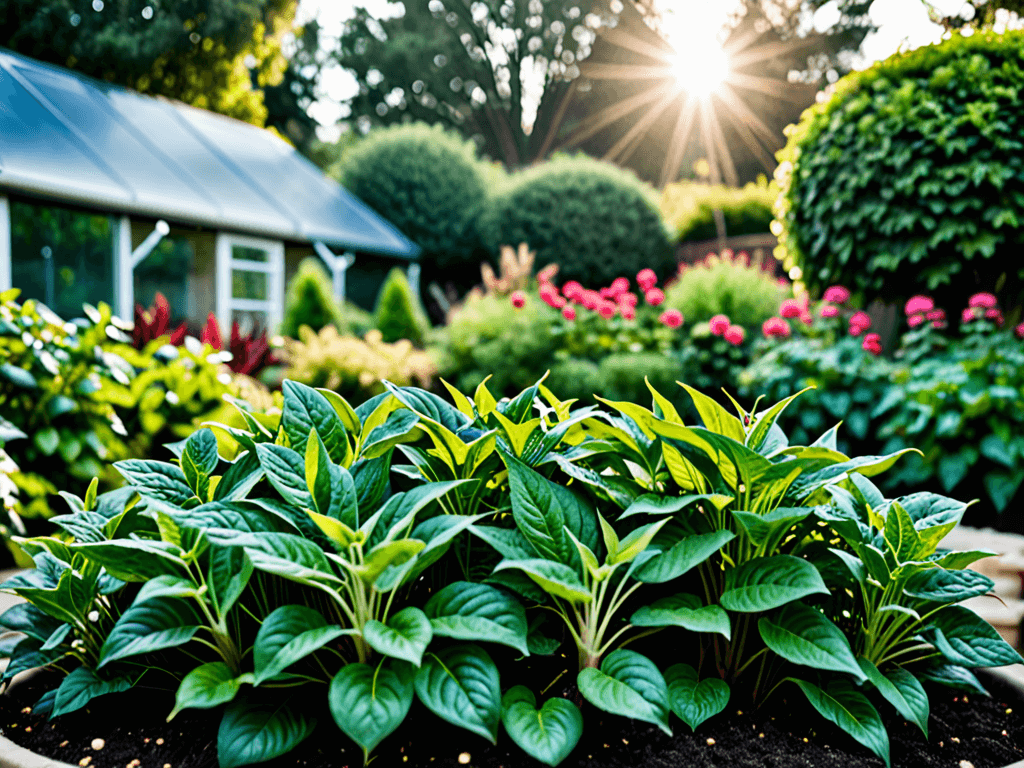Sustainable gardening tips are essential for anyone looking to cultivate an eco-friendly garden.
Embracing these methods not only benefits the environment but also promotes a healthier lifestyle.
In this post, we will explore various techniques such as choosing the right plants, water conservation, and natural pest control to help make your gardening practices more sustainable.
Understanding Sustainable Gardening
Sustainable gardening is about creating an eco-friendly and self-sustaining garden that promotes biodiversity and conserves natural resources.
By understanding sustainable practices, gardeners can significantly reduce their environmental impact.
Key principles include selecting native plants suited to local climates, which require less water and are more resilient to pests.
Avoiding chemical fertilizers and pesticides is crucial to maintaining soil health and protecting beneficial insects.
Implementing water-saving techniques, such as rainwater harvesting and drip irrigation, further supports sustainability efforts.
Composting organic waste not only reduces landfill contribution but also enriches the soil with valuable nutrients, fostering healthier plant growth.
Embrace these strategies to create a thriving garden that supports the planet.
Choosing the Right Plants
Choosing the right plants is essential for a sustainable garden. Consider plants that are native to your area as they are adapted to the local climate and soil conditions, requiring less maintenance and water.
When selecting plants, opt for perennials over annuals to reduce the need for replanting each year.
Assess the sunlight exposure and soil type in your garden to match plant requirements accordingly.
Integrate a variety of plant species to enhance biodiversity, which can naturally reduce pests and diseases.
Additionally, consider edibles such as herbs and vegetables, which provide a sustainable food source while improving the garden’s ecological balance.
Research and choose plants that can coexist well through companion planting techniques, promoting a healthier ecosystem in your garden.
Water Conservation Techniques
Water conservation techniques are vital in sustainable gardening to preserve this precious resource.Mulching is an effective way to retain soil moisture and reduce evaporation. Applying a layer of organic material like straw or wood chips around plants can protect the soil.Drip irrigation systems offer a targeted and efficient way to water plants directly at the roots, minimizing water loss. Utilizing rain barrels to collect and store rainwater provides an eco-friendly water source for gardens. Grouping plants with similar water needs together, known as hydrozoning, ensures optimal water distribution. Lastly, watering plants during cooler parts of the day, such as early morning or late afternoon, helps reduce evaporation, making every drop count.
Creating Homemade Compost
Creating homemade compost is a simple way to recycle kitchen scraps and yard waste into valuable garden nutrients.
Start by selecting a compost bin or designating a compost pile area in your backyard.
Add green materials like fruit and vegetable peels, coffee grounds, and grass clippings, which provide nitrogen.
Balance these with brown materials such as dried leaves, twigs, and newspaper, which contribute carbon.
To maintain airflow and accelerate decomposition, turn the compost regularly with a pitchfork or shovel.
Keep the compost moist but not soggy, resembling a damp sponge.
Once it breaks down into a dark, crumbly substance, it’s ready to enrich your garden soil and boost plant growth.
Natural Pest Control Methods
Natural pest control methods are essential for maintaining a healthy garden without harming the environment.
Encourage beneficial insects like ladybugs and lacewings by providing habitats such as flowering plants and shrubs.
These insects prey on common pests, reducing the need for chemical pesticides.
Introduce natural predators such as birds by setting up birdhouses and feeders.
Companion planting is another effective strategy; for example, marigolds can deter nematodes when planted alongside vegetables.
Use homemade sprays, like a mix of water and neem oil, to target pests directly.
Regularly inspect plants for early signs of pest activity and remove affected foliage to prevent spread.
Implementing Companion Planting
Implementing companion planting involves strategically placing plants together to improve growth and repel pests.
Some plants release natural chemicals that act as pest repellents.
For instance, planting marigolds near tomatoes can deter nematodes.
Basil is known to enhance the flavor of tomatoes and repel flies and mosquitoes.
Partnering beans with corn and squash forms the traditional ‘Three Sisters’ method, where beans enrich the soil with nitrogen, corn provides a structure for beans to climb, and squash acts as a natural mulch.
Monitor plant placements and observe interactions, ensuring each plant benefits from the arrangement.
Climate-Specific Gardening Tips
Climate-specific gardening tips help optimize plant growth by considering the local environmental conditions.
In cold climates, choose hardy plants that can withstand frost and snow, such as kale or pansies. Building a greenhouse can extend the growing season by providing warmth.
In hot, dry areas, select drought-tolerant plants like succulents or lavender that require minimal watering. Mulching helps retain soil moisture and keep roots cool.
For humid regions, ensure good air circulation around plants to prevent fungal diseases. Raised beds can improve drainage in areas with excessive rainfall.
Understanding your climate and adjusting gardening practices accordingly ensures robust plant health and yields.
Maintaining a Sustainable Garden
Maintaining a sustainable garden requires ongoing care and attention to environmental practices.
Regularly monitor soil health by testing pH levels and nutrient availability, enriching it with organic compost as needed.
Implementing crop rotation helps prevent soil depletion and disrupts pest cycles.
Prune plants to remove dead or diseased branches, promoting healthy growth and airflow.
Use mulching to conserve soil moisture, suppress weeds, and regulate temperature.
Encourage biodiversity by integrating a mix of plant species, which fosters a balanced ecosystem and reduces reliance on chemical interventions.
Collect rainwater to aid in irrigation and reduce reliance on municipal water supplies.
These practices ensure a flourishing garden while minimizing environmental impact.
In Conclusion: Nurturing a Sustainable Garden
Embracing sustainable gardening practices not only benefits the environment but also enriches our personal spaces.
By understanding the unique climate conditions and carefully choosing plants, gardeners can create thriving ecosystems.
Water conservation techniques and natural pest control methods further reduce environmental impact while ensuring healthy plant growth.
Moreover, implementing composting and companion planting fosters a self-sustaining garden, promoting biodiversity and nutrient-rich soil.
Continuous maintenance, including soil health monitoring and pruning, plays a crucial role in keeping the garden resilient and productive.
As each garden is a step towards a greener planet, let us continue to cultivate spaces that honor and protect our natural world.
FAQ – Frequently Asked Questions about Sustainable Gardening
What is sustainable gardening?
Sustainable gardening involves using practices that are environmentally friendly and resource-efficient, like composting and water conservation.
How can I conserve water in my garden?
Use techniques like drip irrigation, rainwater collection, and mulching to reduce water usage.
What plants are best for companion planting?
Plants like marigolds, basil, and beans are great for companion planting due to their natural pest-repellent properties and soil benefits.
How do I start composting at home?
Begin by designating a composting area and mix green and brown materials, turning regularly to aid decomposition.
What are natural pest control methods?
Encourage beneficial insects, use homemade sprays, and practice companion planting to naturally manage pests.
How can I create a climate-specific garden?
Select plants suited to your local climate and adapt your gardening practices to temperature and moisture conditions.
Why is soil health important in a sustainable garden?
Healthy soil is crucial for plant growth and resilience, providing essential nutrients and helping retain moisture.
Can sustainable gardening really impact the environment?
Yes, sustainable gardening reduces waste, conserves water, and promotes biodiversity, positively impacting the environment.


